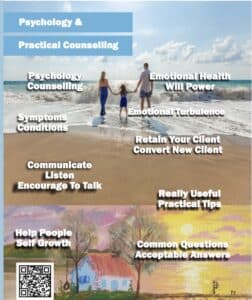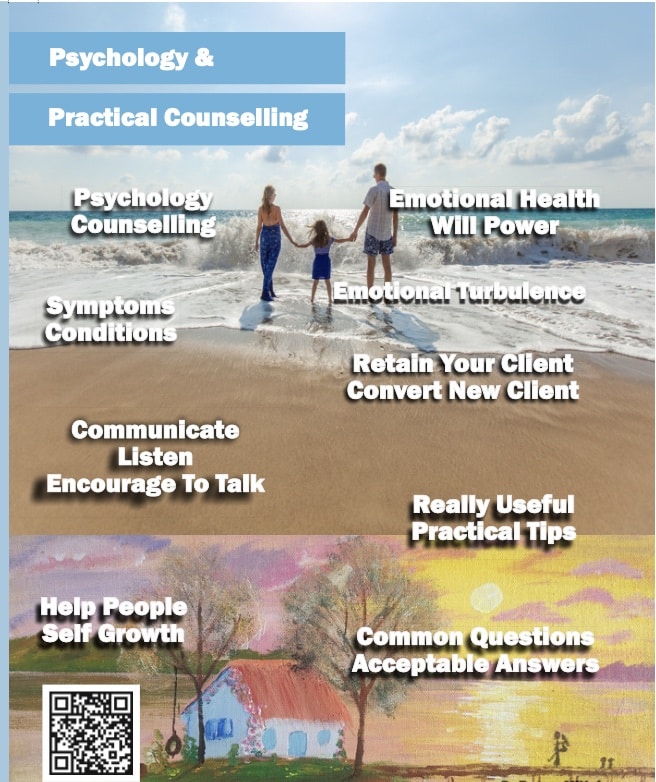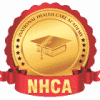Psychology counselling accredited programme
6 months online Advance Programme
Learn how to actually counsel a client for every condition
Learn 11 step structured history taking
Script of conversation between client and counsellor
Learn how to diagnose, manage & counsel clients for each condition with case studies
Become a Psychology Counsellor who knows how to actually counsel and manage clients
Classes and book include how to counsel and manage all psychological conditions like stress, anxiety, panic, depression, OCD, ADHD, Bipolar, Autism, PTSD, schizophrenia, personality, eating, sleep disorders.
Online zoom Classes
Tuesdays 6:30 pm by practising psychologists.
Interactive sessions
More than 100 case studies.
Learn 6 step counselling for each condition and 11 step history taking.
Complete from home
Original copyright books delivered to your home.
Online exam from home after 6 months.
Certificate delivered to home, included in fee.
Certificate valid for all hospitals, NGOs and schools.
Lifetime Mentor
A practitioner is allotted to you to help you with programme brief, study plan and mentorship for career growth.
You will get payment receipt instantly by email. Fee includes everything. No hidden charge.
Relation manager will contact you within few hours and will send you Whatsapp number of your mentor.
Each chapter in book is a psychological condition and includes
- 11 steps structured History taking
- Diagnostic Symptoms
- How to counsel and manage a client in 6 steps for every condition
- Script of conversation between counsellor and client
- Common questions asked by client and good answers
Book is published and copyrighted by NHCA. You will learn actual steps of counselling, history taking and how to manage client for all psychology conditions.
Rs 5 lac reward if you find our content (softcopy/scan/any form) with other institute or a trainer. This challenge gives us information if anyone is using our copyright materials and helps us protect our content.
Conditions
- Symptoms of Psychological conditions
- History taking 11 steps
- Generalised Anxiety Disorder
- Stress
- Panic disorder
- ADHD in adult
- Bipolar disorder
- Depression
- Eating disorder
- OCD Obsessive Compulsive Disorder
- PTSD Post Traumatic Stress Disorder
- Schizophrenia
- Personality disorder
- Sleep-wake disorder
- Loneliness
- Script of conversation between counsellor and client for each condition
Readers find this book interesting, engaging and most practical approach in Psychology as well as Counselling.
- History taking 11 steps
- How to counsel and manage a client in 6 steps for each condition
- Diagnostic Symptoms
- Script of conversation between counsellor and client
- Common questions asked by client and good answers

- 11 step history taking
- Generalized anxiety disorder
- Symptoms and diagnosis of GAD (pg. 19-21)
- Treatment of GAD
- Non-Medical treatment (pg. 22-24)
- Medical treatment (pg. 24-28)
- Home remedies for GAD (pg. 29-33)
- Medication to relieve anxiety (pg. 33-38)
- Coping with stress
- Definition of stress (pg. 41-42)
- Negative stress response (pg. 42-43)
- Acute stress disorder
- Episodic acute stress disorder
- Chronic stress disorder
- Causes of stress (pg. 44-46)
- Symptoms and effects of stress (pg. 46-47)
- Acute stress effects
- Chronic Stress effects
- Stress Management (pg. 47-49)
- Practical techniques to stress treatment
- When to seek help (pg. 49)
- Anxiety
- Causes of anxiety (pg. 55)
- Fear Vs anxiety (pg. 55)
- Your brain and anxiety (pg. 56)
- What are the causes of anxiety? (pg. 56-59)
- Common risk factors for anxiety (pg. 59-60)
- Is anxiety preventable? (pg.60)
- Anxiety signs and symptoms (pg. 61- 62)
- Practical tips to manage (pg. 62)
- Panic Disorder
- What is panic disorder? (pg. 63)
- Symptoms of panic disorder (pg. 64)
- Common physical symptoms
- Psychological symptoms
- Prevalence (pg. 65)
- So, what now/next? (pg. 65)
- How to treat panic disorder?
- Counselling the patient (pg. 66)
- Practical tips to manage (pg. 66-68)
- Medication for panic disorders (pg. 68-71)
- Home remedies and lifestyle changes (pg. 71-72)
- Anxiety screening test (pg. 73-74)
- ADHD
- What is ADHD? (pg. 80-81)
- Symptoms of ADHD (pg. 80-81)
- Causes of ADHD (pg. 80-81)
- Are ADHD and autism associated? (pg. 81-82)
- Are ADHD and bipolar disorder same? (pg. 81-82)
- Do people with ADHD have anxiety symptoms? (pg. 81-82)
- Can ADHD be treated? (pg. 81-82)
- Treatment options for ADHD
- Self-care strategies (pg. 83)
- ADHD impulse control (pg. 84-120)
- ADHD in & adult
- Symptoms of ADHD (pg. 89)
- Diagnosis of ADHD (pg. 90)
- ADHD in adults (pg. 93)
- ADHD symptoms in adults (pg. 93)
- Treatment for ADHD
- Therapy for ADHD (pg. 94-97)
- Medication for ADHD (pg. 97-99)
- Self-help strategies for ADHD (pg. 99-100)
- The 3 subtypes of ADHD (pg.110-112)
- Hyperactive-impulsive type
- Inattentive type
- Combined typed of ADHD
- Does ADHD affect particular group differently? (pg.112)
- Early signs of ADHD (pg.113)
- Treatment methods of ADHD
- Therapy (pg.115)
- Simple behavioral therapy (pg.115)
- Behavioral therapy (pg.116)
- Organizational skills training (pg.116-117)
- Self-care strategies (pg.119)
- FAQs about ADHD (pg.121-127)
- ADHD and kids: tips to soothe tantrums
- What are ADHD meltdowns? (pg.129-130)
- Ways to soothe them (pg.130-132)
- Autism in adult
- What is autism (pg.135)
- Signs and symptoms (pg.135-136)
- Causes of autism (pg.136)
- Diagnosis of autism (pg.136-137)
- Management of autism (pg.137-138)
- Summary and getting help and referrals (pg.138)
- Types and symptoms of autism spectrum disorders
- Autism spectrum disorders- support needed (pg.141-142)
- Autism symptoms
- Communication patterns (pg.142)
- Social skills and interaction (pg.143)
- Non-verbal communication (pg.143)
- Relationships and social connections (pg.143)
- Behavioural patterns (pg.143)
- Rigid routines and preference structure (pg.144)
- Stereotyped behaviours (pg.144)
- Narrowed focus and interest (pg.144)
- Response to stimuli in environment (pg.144)
- Diagnosing Autism spectrum disorders (pg. 145)
- Signs and symptoms of autism in adults (pg.145-146)
- What to do after diagnosis (pg.146-147)
- Management
- Medications (pg.148-149)
- Asperger’s syndrome (pg.152)
- Treatment for Asperger’s syndrome? (pg.152)
- Types of therapy for Asperger’s (pg.153-155)
- How is autism diagnosed (pg.156)
- Developmental screening and testing autism
- Testing for autism (pg.157)
- Medical testing (pg.157)
- Additional testing (pg.158)
- Early signs of autism (pg158-159)
- Autism and friendship – 30 ways to befriend a person on the spectrum (pg.163-166)
- Bipolar disorder
- What is bipolar disorder (pg.167)
- Types of bipolar disorder (pg.168)
- Symptoms of bipolar disorder (pg.168-170)
- Causes (pg.170)
- Diagnosis (pg.170)
- Treatment (pg.170-171)
- Living with bipolar disorder (pg.171)
- Types and symptoms of bipolar disorder
- Types of bipolar disorder (pg.175)
- Symptoms of bipolar disorder (pg.176-177)
- Bipolar disorder Vs depression (pg.177)
- Bipolar disorder and substance abuse (pg.177-178)
- Bipolar disorder in children
- When to talk to a doctor (pg.179)
- Medication tips and treatment (pg.179-181)
- Counselling for bipolar disorder (pg.181)
- Practical tips to manage (pg.181)
- Self-help tips for bipolar disorder (pg.182-183)
- Depression
- What is depression (pg.187)
- Depression symptoms and diagnosis (pg.187)
- Types of depression
- Seasonal affective disorder (pg.188-189)
- Dysthermia (pg.188-189)
- Bipolar depression (pg.188-189)
- Other subtypes of depression (pg.188-189)
- Postpartum depression (pg.188-189)
- Depression risk factors and causes (pg.189-190)
- Depression treatment (pg.190-191)
- Living with depression (pg.191-192)
- Symptoms of major depression
- What is depression (pg.195-196)
- What are the different types of depression (pg.196-197)
- Symptoms of major depression (pg.197)
- What causes depression? (pg.198-199)
- How depression is diagnosed? (Pg.199)
- When to talk with a doctor? (pg.199-200)
- Postpartum depression or baby blues
- What is postpartum depression? (pg.201-202)
- Is it baby blues or postpartum depression? (pg.202-203)
- Causes of postpartum depression (pg.203)
- Symptoms of postpartum depression (pg.204-205)
- When to call a doctor? (pg.205)
- Is it postpartum depression or postpartum psychosis? (pg.205-206)
- How is PPD diagnosed formally? (pg.206)
- Can PPD be treated? (pg. 206)
- Self-help strategies (pg.207-210)
- ECT for PPD (pg. 210)
- Hospitalization for PPD (pg.211)
- Tips from counsellor to client to manage depression (pg.212)
- Counsellor tips for managing depression
- Home remedies (pg.213-214)
- Support groups (pg.214)
- Workbooks (pg.214)
- Exercises (pg.214)
- Diet (pg.214)
- Depression test (pg.216)
- Eating disorders
- Types and symptoms of eating disorders
- Common eating disorders (pg.221)
- Psychological symptoms (pg.221)
- Physical symptoms (pg.222)
- Behavioural symptoms (pg.222)
- Causes and risk factors (pg.233)
- What are the treatment options (pg.223-224)
- Living with an eating disorder (pg.224)
- Helping someone with eating disorder (pg.224-225)
- Anorexia
- Anorexia nervosa symptoms (pg.227-228)
- Physical symptoms
- Psychological symptoms
- Behavioural symptoms
- Signs of anorexia (pg.228)
- Types of anorexia (pg.229)
- When to refer client to a doctor? (pg.229-230)
- Treatment plans for anorexia (pg.230)
- Therapy (pg.231)
- Medications (pg.232)
- Hospitalization for anorexia (pg,233)
- Residential treatment (pg.234)
- Partial hospitalization (pg.234)
- Intensive outpatient therapy (pg.234)
- Self-care tips for anorexia (pg.234)
- Getting an anorexia diagnosis (pg.235)
- Binge eating disorder
- Symptoms of binge eating (pg.237-238)
- Seeking doctor’s help (pg.238)
- Role of a counsellor (pg.238-239)
- Bulimia nervosa
- Symptoms of Bulimia
- Physical symptoms (pg. 242-243)
- Emotional and behavioural symptoms (pg. 242-243)
- Complications of bulimia (pg.243-244)
- Seeking help from counsellor (pg. 244- 245)
- Self-care for eating disorders (pg.246)
- Obsessive-compulsive disorder
- What is OCD? (pg.247)
- Symptoms of OCD (pg.248)
- Living with OCD (pg.248)
- Causes of OCD (pg.250)
- Related conditions to OCD (pg.250)
- Related conditions to OCD (pg.250)
- Treatment options for OCD (pg.250-251)
- Symptoms of OCD in a child and related conditions
- Symptoms of OCD
- Symptoms of obsession (pg. 253-254)
- Symptoms of compulsion (pg. 254-255)
- OCD symptoms in children (pg. 255)
- OCD related conditions (pg.256)
- Diagnosis of OCD (pg.256-257)
- Treatment for OCD
- Exposure and response prevention (Pg.259)
- Practical tips to manage (pg.259-260)
- Imaginal exposure (pg.260)
- Medications (pg.261)
- Paediatric OCD
- Treatment
- ERP (pg.263)
- Transcranial magnetic stimulation (pg. 263)
- Deepcranial magnetic stimulation (pg.264)
- Online platforms to undertake ERP (pg.264)
- Self-care in OCD (pg.264-265)
- Post-Traumatic stress disorder (PTSD)
- What is PTSD? (pg.267)
- Prevalence of PTSD? (pg.268)
- Causes of PTSD (pg.268)
- Risk factors of PTSD (pg. 268-269)
- Symptoms of PTSD (pg. 269-271)
- Diagnosis of PTSD (pg.271)
- Treatment of PTSD (pg.271-274)
- Self-care strategies (pg.274)
- Complications (pg.274-275)
- Co-existing conditions (pg.275)
- Living with and understanding PTSD (pg.275)
- Symptoms of PTSD (pg276-278)
- Diagnosis of PTSD (pg.279)
- Treatment options (pg.279)
- Substance use and addiction disorder
- What us SUD? (pg.283)
- Causes of substance abuse (pg.284)
- Signs and symptoms of SUD and addiction (pg.285)
- How to diagnose SUD? (pg.285-286)
- Treatment of SUD (pg. 286-287)
- Living and managing life with addiction (pg.287)
- Helping with SUD (pg.287-288)
- Signs and symptoms of SUD (pg.289-290)
- Diagnosing SUD (pg. 290)
- Treatment options of SUD (pg.290-291)
- Basic principles of SUD treatment (pg.291-296)
- Outpatient behaviour treatment (CBT)
- Residential treatments with medications
- Psychological and behavioural treatment
- Medications
- Self-care strategies (pg.297)
- Schizophrenia
- Symptoms of schizophrenia (pg.299-300)
- Causes (pg.300-301)
- Treatment (pg.301-302)
- Diagnosis (pg.301)
- Complications (pg.302)
- Symptoms of schizophrenia simplified for a non-doctor (pg.305-309)
- Self-care techniques (pg.310-312)
- Hospital care (pg.310-312)
- Personality disorder
- What is personality disorder? (pg.315-316)
- Diagnosis of PD (pg.316-318)
- Types of personality disorder
- Paranoid personality disorder (pg.318)
- Schizotypical PD (pg.318)
- Schizoid PD (pg. 319)
- Narcissistic PD (pg.319)
- Antisocial PD (pg.319)
- Borderline PD (pg.320)
- Histrionic PD (pg.320)
- Obsessive-compulsive PD (pg. 320)
- Dependent PD (pg.321)
- Avoidant PD (pg. 321)
- Treatment for PD (pg. 321-322)
- Sleep and wake disorders
- What is sleep-wake disorder? (pg.323)
- Common types of sleep-wake disorder? (pg.324)
- Severe sleep disorder and symptoms checklist (pg. 325-326)
- Risk factors for sleep disorders (pg.327)
- Diagnosis of sleep wake disorders (pg. 327-328)
- Treatment (pg.328)
- Practical solutions to sound sleep (pg.329)
- Shyness and solution (pg. 331-332)
- Loneliness Vs solitude
- Defining loneliness (pg.335)
- Am I lonely? (pg. 336)
- Can loneliness be prevented? (pg.337)
- Health complications of loneliness (pg.337)
- Management and treatment (pg.338)
- How to enjoy being alone? (pg. 339)
- Types of people in loneliness? (pg. 339-340)
- 9 types of hopelessness and their solutions (pg.345-349)
Graduate in any stream
Online MCQ exam from your home. Certificate hard copy within 2 months after the exam. Certificate valid for lifetime, so you don’t have pay renewal charge. Certificate valid for all hospitals, NGOs and schools. Syllabus and learning module complies with audit requirements of hospitals, NGOs and schools.
After this programme, you can write in your profile certified Psychology Counsellor.
Become a Psychology Counsellor who knows how to actually counsel and manage clients
Best Learning Standards
Programme complies with audit requirements of hospitals, NGOs and schools.
6 months online Master Class Programme
Certificate does not mention 'online' or 'distance'.
Excellent content
Learn how to take history and manage psychology counselling clients
No hidden charge
You might see a limited time discount below. Amount you will pay includes everything, taxes registration, books, classes, exam & certificate fee, etc. Certificate is valid for lifetime and there is no renewal fee
Book delivered to your home
Included in fees. NHCA published Book includes abnormal psychology and really useful practical counselling solutions for each condition. You will find it useful for personal as well as professional life. Read detailed syllabus below.
Online exam from home
After course completion, you will get 5 day to appear exam. Exam is online and you can appear with your own laptop or mobile from comfort of your home. After submitting MCQ pattern exam, you will instantly get your score by email.
Certificate hard copy
Certificate hard copy delivered to home one month after exam. Certificate is valid for all hospitals, NGOs and schools.
Dedicated relation manager for support on call & WhatsApp
You sure do not like to email to an unknown and await a reply for an eternity. And wasting hours on customer care line is not your style!
Best Workplace
All our employees enjoy an excellent work culture of autonomy and good rewards encouraging them continue to work with NHCA longer and forever. Your relation manager and mentor will have your number saved so that even if you call after years, you will be identified by your name
Best way to get inspired is to get a mentor for lifetime
You will get your mentor's contact details for call and WhatsApp for personal touch to your learnings. Your mentor is someone who likes to connect, help people for no reason. Your mentor will encourage you to be connected regularly to help you grow or make career switch.
Awarded 5 star place to work
We are a team of happy people who enjoy our work. Our mentors are committed to NHCA with lifetime bond to maintain continuity of your inspiring journey with NHCA. You get an opportunity to be in touch with your mentor even after course completion. One of the life's blessing is to find a mentor. Most of our students thank NHCA for this wonderful lifetime gift.
Best features
Do your own search and you will come back to NHCA for practically useful learning through original book and case studies in classes. Remember to come back in time before seats are full for this batch.
Discount only for you
If you have reached here, you have already made up your mind to enrol. Go ahead. It's best decision. To reward your commitment to grow in this career, we are happy to offer you a discounted seat for few minutes.
You will instantly get payment receipt by email. Payment is secured. Fee includes everything. No hidden charge.
Relation manager will contact you within few hours and will send you Whatsapp and calling number of your mentor.
Why people choose NHCA
| Why you will prefer NHCA | NHCA | Local |
|---|---|---|
| Knowledge partner | NHCA has partnered with 250 hospitals, schools & NGOs. Videos testimonials & career journey of studenets | |
| Title on certificate | Accredited Diploma of Completion. NHCA certificate complies with audit requirements of hospitals, NGOs, schools. | Certificate of Participation |
| Hidden charges | Fee includes everything. No hidden charge. | Additional registration, exam & certificate fee |
| Lifetime valid certificate | No renewal charge | Renewal charge |
| Copyright original Hard copy books and certificate | Delivered to home, included in fee | Soft copy or Not original |
| Why choose NHCA | NHCA certificate is accepted by all hospitals, NGOs, schools in India. Watch success stories | Some 'friends' refer you to earn referral fee |
| Eligibility | Relevant Graduate | 12th pass. You don't want to study with lesser qualified. |
| Mentor & Training Manager | Whatsapp & Call, you talk to a practitioner | Email or you talk to a sales person |
| Training Sessions | Online Zoom Class + Recordings + Copyright content | Recordings |
| Fee | No instalment, no discount, no hidden charge. No one will run behind you for admission. After admission you will be in touch with a practitioner for realistic career guidance. | Sales person will call you multiple times, give you 'scholarship' and instalment, with over promises. |
NHCA is most preferred by healthcare professionals, freelancers and psychologists. Accredited programme in Psychology Counselling have been designed to make you a counsellor with practitioner skills and be able to work in hospital, NGO, school, clinic or online consultations.
NHCA course completion certificate is valid for lifetime and course complies with audit requirements of hospitals, NGOs and schools in India.
Syllabus covers practical aspects and the programme is structured to comply with protocols of corporate hospital, NGO job requirements. Certificate is accepted for jobs in hospitals, NGOs and schools in India and further education in relevant field.
Each chapter in book is a psychological condition and includes
- History taking 11 steps
- How to counsel and manage a client in 6 steps for each condition
- Diagnostic Symptoms
- Script of conversation between counsellor and client
- Common questions asked by client and good answers

Psychology Counselling 6 months accredited programme
Online Live zoom classes on Tuesdays 6:30 to 8 pm by practising psychologists and doctors for interactive case study discussions and learning how to actually counsel a client for each condition.
You will get instantly get payment receipt by email. Fee includes everything. No hidden charge. Payment is secured.
Relation manager will contact you within few hours and will send you Whatsapp and calling number of your mentor.
NHCA Admission, Exam & Certificate process
Dr Niveditha Rudraraju Fellow Psychology Behaviour Therapy Child Counselling from NHCA. MD Pediatrician at Tirupati.
Interested in providing free service to needy and special children and opening such rehab centre at my place. NHCA helped to fulfil my dream by developing course suitable for busy professionals like and with personal mentor support
Dr Shama Deo BHMS doctor, complete Fellowship Psychology Counselling from NHCA Singapore and successfully shift her practice to counselling for all age groups with learning and mentorship from NHCA.
Psychology Courses
Books and classes by practitioners cover 100 case studies, diagnostic symptoms, history taking, how to counsel and manage clients for all psychology conditions.
Secured encrypted payment guaranteed
Get payment receipt and confirmation of seat by email instantly. Fee includes everything. No hidden charge. Relation manager will contact you within few hours and will send you Whatsapp and calling number of your mentor.


